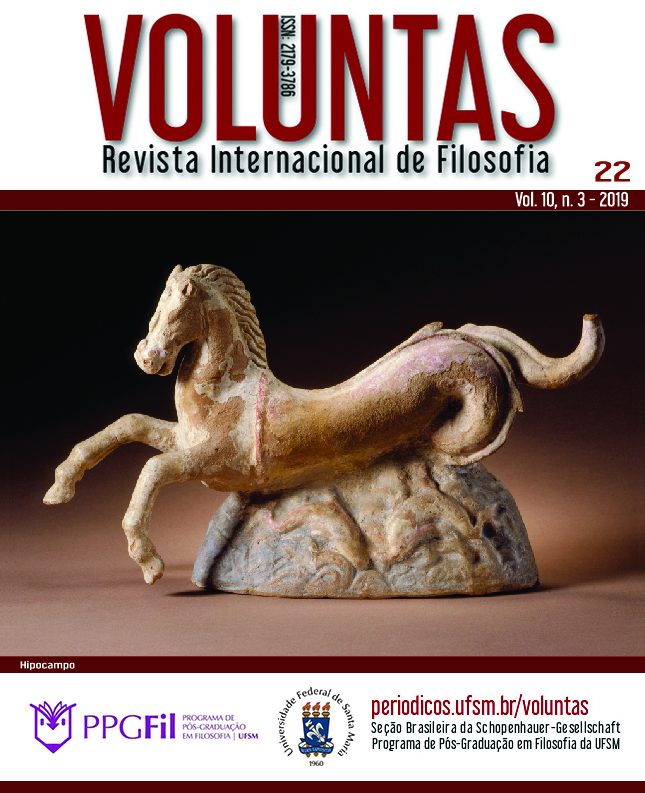Psychogenic amnesia: implications for diachronic sense of self
DOI:
https://doi.org/10.5902/2179378640389Palabras clave:
Episodic Memory, Diachronic Sense of Self, DissociationResumen
Traditionally the issue of personal identity has considered as the question about what makes one the same across time. Recently though, attention to one’s own phenomenal experience has brought a new perspective to the debate. In light of this change of perspective, Klein suggests that individuals with retrograde episodic amnesia retain a notion of who they are, as well as having sense of continuity. He, therefore, argues that episodic memory is not necessary for a diachronic sense of self. I challenge Klein’s conclusion by pointing out that there are more extreme kinds of amnesia—psychogenic amnesia—that seem problematic to his proposal that sense of continuity is enough for a diachronic sense of self. This is the case because some instances of psychogenic amnesia are cases of dissociative amnesia, which show that having continuous conscious experience does not solve the issue.Descargas
Citas
BRAND, Matthias; EGGERS, Carsten; REINHOLD, Nadine; FUJIWARA, Esther; KESSLER, Josef; HEISS, Wolf-Dieter; MARKOWITSCH, Hans J. Functional brain imaging in 14 patients with dissociative amnesia reveals right inferolateral prefrontal hypometabolism. Psychiatry Research: Neuroimaging, v. 174, p. 32-39, 2009.
BRENNER, Ira. Deconstructing DID. American Journal of Psychotherapy, v. 53, n. 3, p. 344-360, 1999.
BUTLER, J. The Analogy of Religion, Natural and Revealed, to the Constitution and Course of Nature. London: James, John, and Paul Knapton. Reprinted New York: Robert Carter, 1736 [1842]. Available via https://archive.org/details/worksofrightreve00butl/page/n305. Retrieved 02 Sep, 2019.
DE BRIGARD, Felipe. Is memory for remembering? Recollection as a form of episodic hypothetical thinking. Synthese, v. 191, n. 2, p. 155-185, 2014.
HUME, David. A treatise of human nature, Book I. L. Ed. A. Selby-Bigge. Oxford: Claredon Press, 1896[1739].
KEAN, Clara. Silencing the self: Schizophrenia as a self-disturbance. Schizophr Bull, v. 35, n. 06, p. 1034–1036, 2009.
KLEIN, Stanley. Self and its brain. Social Cognition, v. 30, n. 4, p. 474-518, 2012.
KLEIN, Stanley. The sense of diachronic personal identity. Phenomenology and the Cognitive Sciences, v. 12, n. 4, p. 791-811, 2013.
KLEIN, Stanley; GANGI, Cynthia E. The multiplicity of self: neuropsychological evidence and its implications for the self as a construct in psychological research. Annals of The New York Academy of Sciences, v. 1191, p. 1-15, 2010.
KLEIN, Stanley.; NICHOLS, Shaun. Memory and the sense of personal identity. Mind, v. 121, n. 483, p. 677-702, 2012.
LOCKE, John. An essay concerning human understanding Book II: Ideas (J. Bennett ed.). 2017. Available via https://www.earlymoderntexts.com/assets/pdfs/locke1690book2.pdf. Retrieved 14 Aug 2018. (Original work published 1689)
MARKOWITSCH, Hans J.; FINK, Georg R.; THONE, Angelika; KESSLER, Josef; HEISS, Wolf-Dieter. A PET study of persistent psychogenic amnesia covering the whole life span. Cognitive Neuropsychiatry, v. 2, n. 2, p. 135-158, 1997.
MICHAELIAN, Kourken. Mental time travel: episodic memory and our knowledge of the personal past. Cambridge: MIT Press, 2016.
PARFIT, Derek. Reasons and Persons. Oxford: Claredon Press, 1984.
REINHOLD, Nadine; MARKOWITSCHE, Hans J. Retrograde episodic memory and emotion: A perspective from patients with dissociative amnesia. Neuropsychologia, v. 47, p. 2197-2206, 2009.
SANT’ANNA, André. Mental time travel and the philosophy of memory. Unisinos Journal of Philosophy, v. 19, n. 1, p. 52–62, 2018.
SCHACTER, Daniel, & ADDIS, Donna Rose. The cognitive neuroscience of constructive memory: remembering the past and imagining the future. Philosophical Transactions of The Royal Society B, v. 362, p. 773-786, 2007.
STANILOIU, Angelica, MARKOWITSCH, Hans J. The remains of the day in dissociative amnesia. Brain Sciences, v. 2, p. 101-129, 2012.
STANILOIU, Angelica; MARKOWITSCH, Hans J. Long lasting personality changes after the onset of dissociative amnesia. European Psychiatry, v. 28, n. 1, p. 1, 2013.
STANILOIU, Angelica; MARKOWITSCH, Hans J.; BRAND, Matthias. Psychogenic amnesia – A malady of the constricted self. Consciousness and Cognition, v. 19, p. 778-801, 2010.
STANILOIU, Angelica; MARKOWITSCH, Hans J.; KORDON, Andreas. Psychological causes of autobiographical amnesia: A study of 28 cases. Neuropsychologia, v. 110, p. 134-147,
SUDDENDORF, Thomas, ADDIS, Donna Rose, CORBALLIS, Michael. Mental time travel and the shaping of the human mind. Philosophical Transactions of The Royal Society B, v. 364, p. 1317-1324, 2009.
TULVING, Endel. Episodic memory: From mind to brain. Annu. Rev. Psychol, v. 53, p. 1-25, 2002.
Descargas
Publicado
Cómo citar
Número
Sección
Licencia
La sumisión de los originales para este periódico implica la transferencia, por parte de autores, de los derechos de publicación impresa y digital. Los derechos autorales para los artículos publicados son del autor, con derechos del periódico sobre la primera publicación. Los autores sólo podrán utilizar los mismos resultados en otras publicaciones indicando claramente este periódico como el medio de publicación original. En virtud de ser un periódico de acceso abierto, está permitido el uso gratuito de los artículos en aplicaciones educacionales, científicas, no comerciales, desde que referenciada la fuente (por favor, vea la licencia Creative Commons en el pie de página de este periódico).






